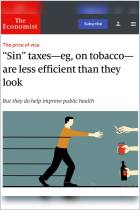Smoking cessation is an uphill battle. Without their regular dose of nicotine, habitual smokers go through powerful withdrawals. Still, of the 34 million smokers in the United States, most will tell you they want to stop smoking. They know that it’s bad for them; they just don’t know how to quit. The monetary costs of ill health are overwhelming, both to the individual and health care providers. When you consider disease and death, the social costs are even worse. So how do you get people to adopt healthy behavior? This episode of the Freakonomics M.D. podcast offers an overview of promising, research-backed strategies.
Monetary incentives can entice people to stop smoking.
Thorndike’s law of effect suggests that a behavior is likely to increase when it’s followed by pleasant consequences. With this in mind, researchers have designed programs that provide monetary incentives to help people stop smoking. Each participant received $30 each time they participated in a smoking cessation support call for the duration of the program, and then they got $40 if they were able to go six months smoke-free.
Unfortunately, even with monetary incentives, only about 22% of the people who were paid to quit smoking actually quit. Still, it’s a higher figure than the control group. Of those who weren’t offered a monetary reward, only 14% were able to quit. In a similar experiment, pregnant women were about 1.5 times more likely to quit when rewarded with money.
Monetary incentives are less likely to inspire long-term weight loss, though employing “loss aversion” works for exercise programs.
Freakonomics M.D. is hosted by Dr. Bapu Jena, a Harvard professor, physician and economist. He researches health economics and policy.























Comment on this summary or Iniciar a Discussão